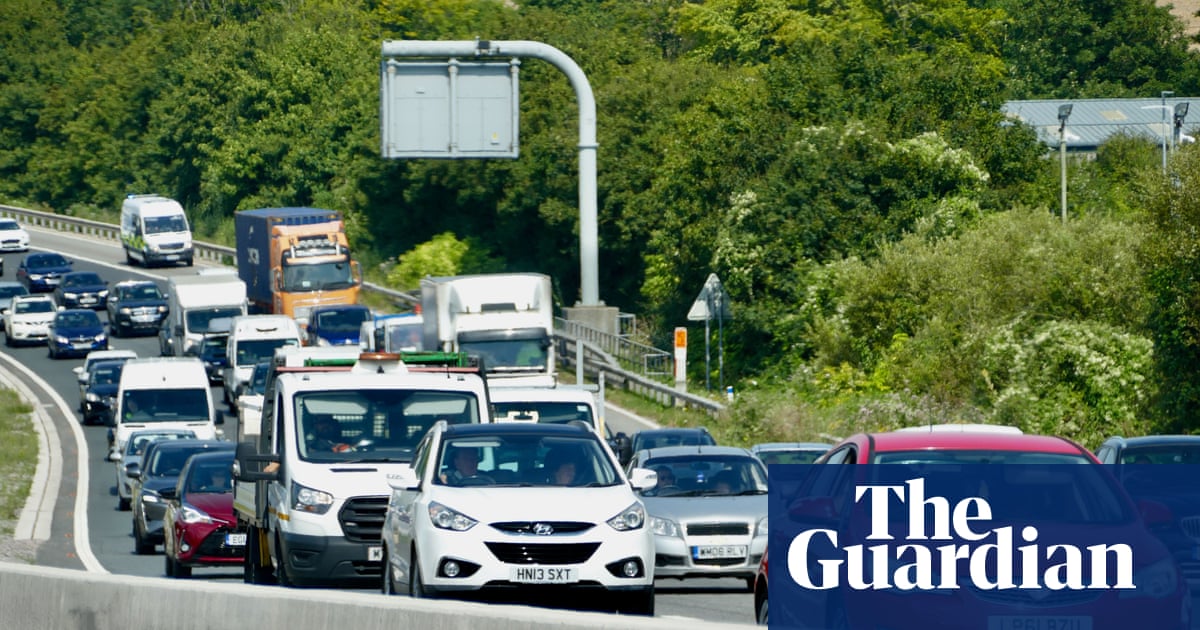Britain is set for the busiest August bank holiday getaway on the roads in nearly a decade, with severe delays expected on routes towards the Leeds and Reading music festivals, despite overseas tourists continuing to stay away.
An estimated 19.2m leisure journeys by car are expected over the weekend, according to the RAC – the highest level since the breakdown services company began recording traffic data in 2015 – as drivers go “day-trip crazy”.
Saturday 24 August is set to be the busiest on the roads with 3.7m getaway trips planned, slightly ahead of the 3m planned each day over the rest of the weekend. A further 6.2m trips are planned at some point over the late summer bank holiday weekend, with drivers undecided exactly when they will travel. The vast majority of the outings will be day trips, according to the RAC’s research.
Alice Simpson, the RAC’s breakdown spokesperson, said: “Whether you’re off to a festival, the coast or a theme park, or meeting up with friends and family elsewhere, the usual trusted advice applies: leave as early as you can to avoid the jams or be prepared to sit in some lengthy queues.”
While Britons are getting back on the road, the number of overseas visitors to the UK this year is expected to remain 5% below pre-pandemic levels at 38.7 million, according to a separate report on Monday.
The Centre for Economics and Business Research (CEBR) said that while overseas visitor numbers to the UK were up on the 38 million who arrived last year, travellers were spending less per capita while they were in the country if inflation was taken into account.
Figures from the Office for National Statistics show overseas visitors spent £31.1bn in the UK last year. VisitBritain expects this figure to rise to £32.5bn this year, compared with pre-pandemic levels of £28.4bn recorded in 2019.
However, the CEBR said that adjusting for inflation would mean overall tourist spending remained 8% lower than the equivalent figure in 2019 – equivalent to a £2.8bn “hole” in tourist spending.
It warned that spending was being dampened by a mix of post-Brexit travel barriers, the removal of tax-free shopping for tourists, and concerns about the recent riots across several towns and cities which led to some countries issuing advice to their citizens regarding the safety of travelling to the UK.
The CEBR said the UK had also become comparatively more expensive for some visitors after a dramatic increase in the prices of accommodation, dining out and air fares. A rise in the value of the pound against the euro and Chinese yuan had also reduced the purchasing power of overseas tourists. Visitors from the US, however, have benefited from a stronger dollar.
after newsletter promotion
Despite the difficulties for tourists, the Port of Dover expects more than 20,000 cars to travel through its harbour over the August bank holiday weekend on inward and outbound journeys. Peak hours are expected to be between 6am and 1pm each day.
Doug Bannister, the chief executive of the Port of Dover, said capacity at pre-border processing areas was reduced amid works to prepare for the introduction of a new EU entry and exit system in November, so travellers might experience longer waiting times.
“Rest assured you will get away on the next available sailing,” he said. “We continue to advise those sailing from the Port of Dover that it is still necessary that they do not arrive any earlier than the two hours requested.”










